David Dubrow's Blog, page 5
October 8, 2019
Podcast Interview: Another Bleeping Podcast
 I was recently interviewed on a podcast titled Another #@%*! Podcast on KLRN Radio. This was a live interview, no do-overs or editing.
I was recently interviewed on a podcast titled Another #@%*! Podcast on KLRN Radio. This was a live interview, no do-overs or editing.
Despite that, I killed it, of course. I discussed my Armageddon series, the Appalling Stories series, publishing in general, and some of the inherent problems with conservative media that prevent books like Appalling Stories from getting wider distribution on the right. Plus, as an added bonus, I described, for the first time in any public forum, what I’m working on right now!
Click here to listen. It’s the best 30 minutes of audio you’ll hear all day!






October 3, 2019
Movie Review Resurrection: Strip Club Massacre
I used to write book and movie reviews for the now-defunct but much-missed horror site The Slaughtered Bird. While many of the movies I watched for review were absolutely horrible, some were terrific. After you’ve seen enough bad, zero-budget indie horror films, you really find an appreciation for those few movies that can transcend their lack of funding, creating well-written or otherwise unique films that you remember.
Strip Club Massacre is not one of those movies. But I did enjoy writing a review of it in the same way that one might enjoy digging out an ingrown toenail. Once it’s over, you feel better. Here’s my review, rescued from erasure.
—
If you’ve ever wanted to break into indie filmmaking, read on because you’ll find what I’m about to say uplifting. Strip Club Massacre, co-written and directed by Bob Clark, proves that anyone, regardless of skill, equipment, money, or talent, can make an independent film and find a distributor for it. So grab a camera, get out there, and start filming: the light is green.
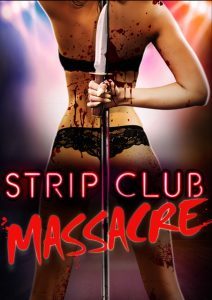 The best thing about Strip Club Massacre is the title, because it perfectly sets up exploitative expectations. Where things sort of fell apart was in all aspects of the execution: the substandard B.P.M. (Boobs Per Minute) and the actual massacre itself, which may set a record for the slowest, most tedious mass murder in cinematic history. The poor B.P.M. rating isn’t a crushing disappointment, as at last count there are more websites devoted to the exposition of bare bosoms than there are stars in the sky, but what I found odd was the casting choice: none of the strippers with speaking parts actually, well, stripped. Or danced very much. In any other genre this wouldn’t be an issue, but this is an exploitation movie with Strip Club in the title, so it’s a problem.
The best thing about Strip Club Massacre is the title, because it perfectly sets up exploitative expectations. Where things sort of fell apart was in all aspects of the execution: the substandard B.P.M. (Boobs Per Minute) and the actual massacre itself, which may set a record for the slowest, most tedious mass murder in cinematic history. The poor B.P.M. rating isn’t a crushing disappointment, as at last count there are more websites devoted to the exposition of bare bosoms than there are stars in the sky, but what I found odd was the casting choice: none of the strippers with speaking parts actually, well, stripped. Or danced very much. In any other genre this wouldn’t be an issue, but this is an exploitation movie with Strip Club in the title, so it’s a problem.
The protagonist Megan is having the worst possible day: she gets laid off from her desk job, comes home early to find that her hateful boyfriend is banging her roommate, and subsequently gets thrown out in the street. So she goes to live with her friend, whose hateful boyfriend is the co-manager of a strip club. With few skills and no money, what’s a woman to do? Why, work at the strip club, of course. Things go from white-trash to worse in short order, what with the homicidal strippers and the awful customers, culminating in scenes of vengeance that might have been horrific if the special effects hadn’t been handled by Chef Boyardee.
The acting and writing are what you might expect from such a movie. Memorable lines include, “You can choke on your fucking bagel,” and, “What are we gonna do with this scrawny little twat?” What, indeed? (I did laugh at that last line because it’s always funny when someone says “twat.”) The shaky, often out-of-focus camerawork; mid-scene iris adjustments; poor color balancing; bizarre framing where the actors talk to the right edge of the screen from the right third; clumsy scene changes; specks on the lens that follow the action from scene to scene; and horrible sound editing suggest a certain lack of familiarity with video production, to be charitable.
There’s plenty of violence, though the vast majority of it is pointless, glacially-paced, and poorly-performed. One girl’s eyes are removed with a corkscrew (quite a feat, that). A guy gets his penis sliced off, and the trauma of the event is such that he dies immediately afterward (wouldn’t you?). People are shot with plastic guns and die. In the most entertaining scene in the movie, a man is raped with a crowbar, and bloody chunks of rectal flesh and/or fecal matter dribble out of his abused anus onto the floor in reddish plops that look exactly like canned spaghetti and meat sauce, down to what might have been strands of pasta in the mess.
Obviously the movie doesn’t take itself seriously, and nor should the viewer. Will you be entertained by Strip Club Massacre? Can’t say. Maybe it falls under the So Bad It’s Good category, and I missed the intent of both producer and distributor. You’ll have to decide if its runtime is an hour and 41 minutes you’ll regret spending at a screen, and make your life choices accordingly. Let us know either way at The Slaughtered Bird.






September 26, 2019
Why Meadow Died: A Review
While you’ve most likely heard of the February 14, 2018 Parkland school shooting, where a deranged man murdered 17 students and faculty (and wounded 17 others) at Marjory Stoneman Douglas High School in Parkland, Florida, you’re probably not aware of the entirely preventable chain of events that led up to it. If just one person with any authority had done one thing properly, this horror could have been avoided. I know this because I read Andrew Pollack and Max Eden’s Why Meadow Died: The People and Policies that Created the Parkland Shooter and Endanger America’s Students.
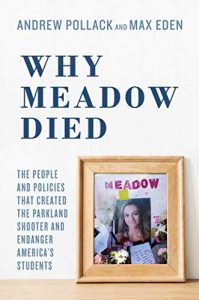 Outside of this book, it’s impossible to fully describe how everything went so wrong, from the disgustingly negligent school board to the terrible policies that provided cover for murderer Nikolas Cruz (referred to by criminal case number 18-1958 in the book). The Broward County school district administrators, as worthless a collection of reprobates as you’ll ever read about, were focused on a social justice platform that minimized academics and safety in favor of feel-good progressivism, and children were murdered as a result. This was not only a failure of the public education system, but of law enforcement and local government, showing exactly what happens when politicians are given free rein without accountability. This quote from the book encapsulates the social justice agenda perfectly:
Outside of this book, it’s impossible to fully describe how everything went so wrong, from the disgustingly negligent school board to the terrible policies that provided cover for murderer Nikolas Cruz (referred to by criminal case number 18-1958 in the book). The Broward County school district administrators, as worthless a collection of reprobates as you’ll ever read about, were focused on a social justice platform that minimized academics and safety in favor of feel-good progressivism, and children were murdered as a result. This was not only a failure of the public education system, but of law enforcement and local government, showing exactly what happens when politicians are given free rein without accountability. This quote from the book encapsulates the social justice agenda perfectly:
Arielle later lamented to us that school administrators “would freak out if somebody called me a dyke or something, but they didn’t care when [18-1958] threatened to kill my friends.”
Pollack, whose daughter Meadow was murdered while trying to save another, younger girl, spares no one in his search for answers, and his agony leaps off the page. This take-no-prisoners approach includes some hard truths about David Hogg, who became an anti-gun activist and celebrity because he attended Marjory Stoneman Douglas (MSD). In the aftermath of the shooting, Pollack and some of the other MSD parents worked hard to get Richard Mendelson, best friend of shooting victim Aaron Feis, elected to the Broward County school board. By then, David Hogg had achieved some notoriety, and it would have helped Mendelson’s campaign to get a Tweet or some kind of endorsement from Hogg. This is what happened:
Hunter [Meadow’s brother] insisted that David [Hogg] at least get on the phone with Rich Mendelson.
David practically shouted at Hunter, “I’ve met with your candidate three times!”
“No, David,” Hunter said. “You met Ryan Petty, who lost his daughter Alaina. We’re talking about Rich Mendelson, who lost his best friend Aaron. Have you been following any of this?”
Hogg doesn’t come off well, and for good reason.
The police screwed up. The school screwed up. The administrators screwed up. Everyone screwed up in the worst ways possible at all times. Whenever there was an opportunity to do one thing right, everyone involved took the opposite approach. It’s maddening to read about (and incalculably worse to experience).
Why Meadow Died isn’t about guns. It’s about an appalling level of corruption that, if left unchecked, will completely corrode an already ailing public education system. It’s bitter, searing, frustrating, and one of the most important books you’ll ever read.






September 19, 2019
Two Book Reviews
I want to tell you about a couple books I read. Every once in a while you find a novel or two that’s hard to forget.
—
Roger Keen’s Literary Stalker is written about writers for writers, but if you’re not masochistic enough to consider yourself a writer don’t let that put you off: it’s a tremendously fun read for anyone. Throughout the book, Keen aptly skewers both the act of writing and the business of writing so accurately that I found myself simultaneously snickering aloud and squirming in my chair whilst reading it, which works perfectly for something one might call a metafiction thriller.
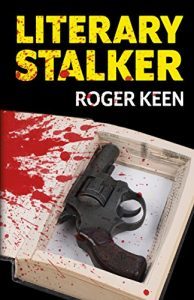 The main character, Nick Chatterton, is a gay man trying to break into the novel-writing business after having had several horror short stories published. I only mention that Nick’s gay because his lifestyle takes up a not-insignificant part of the novel, and some of the graphic detail had me dreading what might happen next. During his career, Nick has made some enemies/frenemies, and as he writes this new novel after the style of the Vincent Price revenge movie Theatre of Blood, he blurs the line between his protagonist’s murderous actions and his own. Everything leads up to Nick facing his imagined (or not-so-imagined) nemesis, a Neil Gaiman-like author with massive popularity, and things explode from there.
The main character, Nick Chatterton, is a gay man trying to break into the novel-writing business after having had several horror short stories published. I only mention that Nick’s gay because his lifestyle takes up a not-insignificant part of the novel, and some of the graphic detail had me dreading what might happen next. During his career, Nick has made some enemies/frenemies, and as he writes this new novel after the style of the Vincent Price revenge movie Theatre of Blood, he blurs the line between his protagonist’s murderous actions and his own. Everything leads up to Nick facing his imagined (or not-so-imagined) nemesis, a Neil Gaiman-like author with massive popularity, and things explode from there.
Keen (and I must say this) has a keen eye for the passive-aggressive, transactional nature of social media, showcasing both its absurdity and how seriously we take it. “If you don’t click Like on my post, I won’t Retweet your book sale link,” etc. Not only that, but he delves deep into the psyche of a stalker’s twisted personality, with the jealousies, fantasies, and delusions that come with it.
Across the board, Literary Stalker does what it sets out to do, and does it extremely well. I can’t say that about a lot of recently-written fiction, so check this one out.
—
Samuel Finlay’s Breakfast with the Dirt Cult is a profoundly affecting novel about the war in Afghanistan, and what the conflict does not just to protagonist Tom Walton, but everyone in his orbit. I know nothing about the writer myself, but the text makes one imagine that it’s a semi-autobiographical piece, a wrenching memoir of a young man’s time in the U.S. Army.
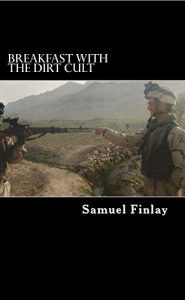 Tom Walton is an intellectual kind of soldier, as comfortable with Aristophanes as he is with a battle rifle, and much of the action takes place inside of his head. His musings on civilization, politics, culture, and intimate relationships get extremely raw at times, and much of it is inarguable, even if it devolves into occasional ranting. We get to know Tom inside and out, no-holds-barred, and in learning so much about him we can’t help but become him in both major events and minor.
Tom Walton is an intellectual kind of soldier, as comfortable with Aristophanes as he is with a battle rifle, and much of the action takes place inside of his head. His musings on civilization, politics, culture, and intimate relationships get extremely raw at times, and much of it is inarguable, even if it devolves into occasional ranting. We get to know Tom inside and out, no-holds-barred, and in learning so much about him we can’t help but become him in both major events and minor.
I didn’t serve in the military and can’t speak firsthand to its accuracy. Nevertheless, his descriptions, characters, and use of jargon all ring true from my time working with veterans. The futility, for example, of climbing a mountain in the dead of winter to look for a terrorist who’s already fled, and the often arbitrary and capricious rules governing personal/professional conduct are starkly drawn, and make one wonder what exactly we’re trying to accomplish with our presence in Afghanistan.
Long stretches of the text are absolutely hilarious. The conversations are exactly how men talk, particularly men put under enormous pressure and in close quarters for extended periods of time.
If I had a criticism, it’s that the parts of the novel where Tom is no longer in the field dragged a little; the story structure needed that tent peg of danger to maintain its momentum. Nevertheless, Tom’s trials and agonies leap off the page and throttle you, keeping you gasping for breath with each turn of the page.
If you read nothing else about the war in Afghanistan, this is the book you need.






September 12, 2019
Book Review Resurrection: The Scarlet Gospels
I wrote for a horror website called Ginger Nuts of Horror until the site’s proprietor, Jim McLeod, kicked me off the site and called me, a Jewish man, a Nazi for expressing my political opinions in my own virtual space. Because I had the temerity to call him out on it, he instituted a purge, deleting all of the articles I’d written for Ginger Nuts of Horror. The following review of Clive Barker’s novel The Scarlet Gospels is one of the articles he deleted.
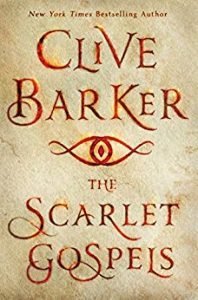 The problem with raising the bar is that you always have to reach higher just to maintain. Any substantive discussion of the horror genre must include Clive Barker: he’s shaped dark fiction in a way few writers have the skill or imagination to accomplish. We all have favorite authors, some of whom take familiar tropes in surprising directions or amaze us with their power of description. They’re great, but they aren’t Barker, a man who isn’t just in a class by himself, but created a new classification to be the master of. On his worst day, he’s still fantastic.
The problem with raising the bar is that you always have to reach higher just to maintain. Any substantive discussion of the horror genre must include Clive Barker: he’s shaped dark fiction in a way few writers have the skill or imagination to accomplish. We all have favorite authors, some of whom take familiar tropes in surprising directions or amaze us with their power of description. They’re great, but they aren’t Barker, a man who isn’t just in a class by himself, but created a new classification to be the master of. On his worst day, he’s still fantastic.
So what happened with The Scarlet Gospels?
There’s no need to reiterate plot synopses or discuss the novel’s importance to the horror genre. This piece is more a post-mortem than a standard review, so if you haven’t read it yet, I would suggest that you do so right away. Further on, there will be spoilers. Despite its flaws, The Scarlet Gospels is an amazing read, and I found myself drawing it out, rereading some passages and taking breaks to savor the experience. You don’t do that with a book you hate.
Nevertheless, The Scarlet Gospels fell short. We’re used to something visionary from Barker, something that will paint a new picture of grotesquerie in the mind’s eye, frame it, and hang it in a place of honor. What we got instead was a pencil sketch.
The novel’s greatest flaw is its inherent sloppiness. This is a book Barker wanted to be done with so he could move on to something else. Despite the shattering events in the novel, from describing the death of a beloved horror icon to the literal destruction of Hell, there’s no feeling of the epic, no sense that what’s happening has import beyond the limited perspective of the characters. The ending is abrupt and anticlimactic, providing us with glimpses of majesty but no resolution. Is this the first in a new series? Will there be a Second Gospels? If not, do we really need to know that pizza is Lucifer’s favorite food?
—
Pinhead Problems
The novel’s main antagonist, Pinhead, was always going to be a massively difficult character to pull off. Everyone comes to The Scarlet Gospels with a series of preconceptions, even those who aren’t Barker fans, precisely because of Pinhead’s looming presence in the horror genre. For some time, Doug Bradley’s scarified, nail-studded face was horror. In literature, however, he was a cipher: a minor character in The Hellbound Heart. What we expect from Pinhead must necessarily be an amalgam of Doug Bradley’s performances in a series of movies Barker himself had little to do with (aside from the first), and some comic book appearances. With that in mind, Pinhead is still Barker’s demon to kick around, and what the Hell Priest does or doesn’t do is up to Barker, not us. You can’t write a character by committee.
Pinhead’s fate was not unexpected: defeat by Lucifer, humiliation, and disintegration. Barker himself said, “One of the things I’m trying to do in the story with D’Amour and Pinhead is, I actually want to kind of make Pinhead feel fucked. I want people to make fools of him as he breathes his last and with no hope of resurrection. No sequels. I swear the way he’s going – I have plotted this – the way he’s going is so total, is so complete that the most optimistic film producer in Hollywood could never dream of resurrecting him!” Fair enough, but at the end, he very much resembled Kuttner Dowd from Imajica. Dowd, Imajica’s antagonist, had been defeated, almost killed (thrown into the well beneath The Pivot and then mashed by chunks of The Pivot when it disintegrated). Despite terrible injuries, Dowd was able to recover long enough to cause more grief before a true death by killing Oscar. Compare this to Pinhead’s end: after Pinhead’s maiming at the hands of Lucifer, he was still able to rape and murder Norma, as well as blind D’amour. Note also how blindness is used as a theme in both Imajica and The Scarlet Gospels: Quaisoir blinded by rebels, D’amour blinded by Pinhead. Pinhead’s mission on Earth to steal magic is also reminiscent of Imajica’s Tabula Rasa organization. It can be argued that these similarities of theme and character are part of Barker’s inimitable style, but not convincingly so: they’re retreads. We’ve seen them before.
—
Damned D’amour
D’amour’s treatment in the novel was colorless. He could have been any tattooed detective: hard-drinking, hard-boiled, on hard times. While the flashback with the Masturbating Demon was interesting, it didn’t provide us with any insight as to D’amour’s character. His relationship with Norma felt forced: we simply had to assume their love for each other, without any build-up. Their closeness was just a spur to get him to travel to Hell. Amazingly, not one of the events of Everville were referred to in any meaningful way whatsoever. I thought that the Iad Ouroboros were scratching at the shores of Quiddity, ready to body surf to Earth. What happened to them? Is D’amour’s fate now to mirror that of Jennifer Love Hewitt in The Ghost Whisperer?
—
Is This Hell?
Hell, as depicted in the novel, had little to do with the Hell we’re familiar with. Where were the sinners? Did they all just live in Fike’s Trench? In which case, what happens to them when they die in Hell? Hell has mansions and temples and a Monastery of the Cenobitical Order, but without the underlying purpose of punishing sinners, Hell in The Scarlet Gospels may as well have been the back streets of Yzordderrex or The Fugue. It’s a fascinating place, full of dark wonder and bizarre architecture, but it isn’t Hell. Barker redefined it into something unrecognizable. If Pinhead’s job as a Hell Priest isn’t to punish sinners, then what is his job? Where does the Cenobitical Order fall in the infernal hierarchy? The Unconsumed, one of Hell’s leaders, says to Pinhead, “A Cenobite is to work within the system. You seem content to work outside that system.” What system isn’t he working in? Without knowing this, Pinhead’s ouster lacked narrative punch.
—
Damn You Christian Hypocrites
If there is one central theme running throughout The Scarlet Gospels, it’s explicitly anti-Christian. Every time Christianity is mentioned, it’s linked to hypocrisy, abuse, and evil. Carston Goode, the ghost who brought both Norma and D’amour into the events of the story, was one such hypocrite. Despite “a deep-seated faith in the generosity of the Lord his God,” Goode is a sorcerer with a secret life of sexual deviance.
D’amour himself is a survivor of childhood rape at the hands of classmates at St. Dominic’s All Boys Catholic School, where “The Fathers all had their favorite” boys to molest (for his part, D’amour “had more kick in him than any of the Fathers were willing to handle.”). Despite how awful this must have been, D’amour’s childhood sexual abuse simply received a couple of throwaway paragraphs in service of telling us that D’amour abhors the smell of old books. Was that really the best way to explain why D’amour hates that old book smell, or was Barker simply falling back on the hackneyed theme of Catholic pederasty?
After the Harrowers’ escape from Hell, they are picked up by the Reverend Kutchaver, who rails at them when he learns that Dale and Caz are gay: “’I have watched damned sodomites like you.’ He pointed at Caz. ‘And you’—now at Dale—‘driven by demons whose faces were foul beyond words.’” Unable to bear the presence of the Harrowers, Kutchaver abandons the car, shouting obscenities in a most unreverend manner. Another anti-Christian scene: tiresome, clichéd, and overdone.
Lucifer’s destruction of Hell is itself a gigantic “fuck you” to God, and the angels are depicted as idiotic buffoons, easily dispatched. God, one presumes, is as absentee in Heaven as Lucifer had been in Hell; in any event, He seems to have taken little notice of the events of the novel. This is where the sloppiness of The Scarlet Gospels cheapens the climax: with a Hell that’s unrecognizable as Hell and a suicidal Lucifer as the unwilling, uncaring landlord, why should Hell’s destruction carry any meaning whatsoever? Why should we care about what Lucifer does as Alice Morrow’s boy toy? Lucifer’s fate echoes our own: we’re left at sea, lacking closure.
Regardless of your personal feelings about Christianity, isn’t the theme of Christian hypocrisy just a little bit tiresome already? Outside of the Christian fiction genre, wouldn’t it be nice to find a devout Christian in fiction who isn’t a homophobe and/or a sinful hypocrite? The default inclusion of the theme of Christian hypocrisy strikes me as unnecessary at best, or a sop at worst to readers of a certain mindset. (I should probably point out here that I’m not a Christian, nor have I ever been. My criticism is born out of an appreciation of quality, not offense at content.)
—
There are other minor examples of sloppiness: the contradictory description of the Unconsumed, where in one sentence it says, “his body was now blackened by heat,” and a few sentences down, it says, “Yet somehow, the rest of him—his skin, flesh, and bone—was unaffected by the volcanic heat in which he sat,”; the strangeness of everyone expecting that Lana, a lesbian, and D’amour would come together romantically at some point; and how Pinhead was able to go on a magician-killing spree without being summoned by a Lemarchand Box; but my point here isn’t to utterly trash the novel. I understand that as fans it’s very hard for our expectations to be met, and that disappointment is often as much a function of reader angst as the writer’s efforts. The Scarlet Gospels is a good book. I liked it.
I just think it could’ve been better. It should have.






September 6, 2019
Black: K-Drama Review
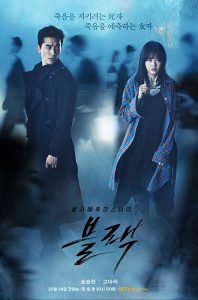 I like things to be tight. Joseph Simonet, a tremendously skilled, thoughtful martial artist with a terrific sense of humor, said in one of his instructional videos, “In martial arts, like in everything else, tighter is better.” Those of us who know Joseph know what he meant by that. It’s the same thing writing fiction: you want to cut out extraneous words and have your characters move the plot forward through their actions. Nothing wasted. That’s tightness.
I like things to be tight. Joseph Simonet, a tremendously skilled, thoughtful martial artist with a terrific sense of humor, said in one of his instructional videos, “In martial arts, like in everything else, tighter is better.” Those of us who know Joseph know what he meant by that. It’s the same thing writing fiction: you want to cut out extraneous words and have your characters move the plot forward through their actions. Nothing wasted. That’s tightness.
As great as a tightly-written story can be, too much tightness can choke the reader. This is the case with the Korean urban fantasy drama Black, available through Netflix. Compelling, well-produced, and hopelessly over-complicated, everything in every episode is connected to something else, turning it into the television version of a Klein bottle with about seventy-seven openings.
Describing the story is simple, but the plot gets so convoluted that it defies explanation. It’s about a young woman with the ability to see who’s about to die, and, if she gets close enough, how. She meets a detective who is murdered, gets possessed by a Grim Reaper (a Grim Reaper is a ghostly being who escorts newly-disembodied souls to the afterlife), and spends the rest of the 18-episode run trying to figure out who killed him and why.
Ara Go plays the death-seeing young woman Ha-ram with workmanlike competence. Physically she fits the role well, but invests little into her performance. The stand-out is Seung-heon Song as Black/Joon/the Grim Reaper 444: he starts with appropriate amorality and arrogance, and over time develops enough humanity to turn him into a sympathetic, understandable character. Both are likable, as are the dozens of side characters who attain admirable depth; you care about what happens to all of them. After over twenty hours of the show, you have no choice, really.
Black‘s complexity forces you to pay attention to everything; its attention to detail leaves you with no room to breathe. This minor figure turns out to be a major figure who is tragically killed off just when he gets interesting, but you see what he was up to in flashbacks involving other minor characters, who end up becoming much more important characters later on because of things they did in other flashbacks. With so many people running around, the names can get very confusing; this is a South Korean show, after all, and names like Man-shik and Woo-sik don’t stick in the American memory the way Frank and George might. Can’t be helped.
During the show, the character Black is occasionally helped by a pair of Grim Reaper colleagues whom nobody else can see. They always steal the show, mixing gravity, pathos, and humor in entertaining ways.
In tone, Black is all over the place, which can be jarring, even off-putting. Slapstick humor sits cheek by jowl with brutal violence, and at times you’re not sure if you should laugh or not. Certain scenes are extremely hard to watch: stuff that wouldn’t get past American censors. It isn’t the violence, but who the violence is occasionally performed upon that can be disturbing. As is typical for the K-dramas I’ve watched, familiar themes of suicide, familial relationships, and government corruption figure prominently throughout. Children in Black are abused, abandoned, adopted, and even murdered; even though it’s clear that death is not the end of existence, it’s still tragic and to be avoided. The attempts at romance between characters fell flatter than a lead dirigible. There’s chaste and discreet, and there’s distant and awkward. Black fell into the latter category.
The last episode is extremely bad. Particularly the last ten minutes. People familiar with the production say that Black was intended to be a 20-episode show, but it had to be cut to 18, and the original writer couldn’t/didn’t do the final wrap-up. Everything got hurried. With so many moving parts, several issues were left unaddressed by the closing titles. I can only judge the output, not the intentions. So the ending was the kind of failure that leaves you writing the finale in your head later on and pretending that’s what happened.
I enjoyed watching Black, but I don’t know if I can recommend it. Binge-watchers who want to turn their brains on instead of off will dig it and overlook the final episode’s shortcomings. If you decide to give it a try, just know that the slapstick humor does start to taper off in the early episodes, and it gets quite dark later on.






August 29, 2019
Escape from Trumplandia: The Inside Story
While the anthology Appalling Stories 2: More Appalling Tales of Social Injustice was still in its planning stages, my friend and fellow writer Ray Zacek offered to show me a piece of writing he’d done. It was fragmentary, just a few chapters, and he asked if I could help him flesh it out. Maybe we’d include it as a novelette in Appalling 2. I said sure, I’d consider it, and read what eventually became the penultimate chapter of the satirical novella Appalling Stories 3: Escape from Trumplandia.
What Ray had written was extremely funny, defying genre conventions the way good satire can, but it was unfinished: the punchline of a long joke. We worked on it for months; the cooperation spurred us to complete a narrative that said what we wanted to say in the way we wanted to say it. Ray’s a surprising writer and came up with things I didn’t expect; for example, the intimate encounter near the end of the book was, for the most part, his creation, and I found myself cringing while reading it. That made it perfect. If a piece of satire doesn’t take you out of your comfort zone every once in a while, it’s worthless.
Satire often fails because the writer hates the characters or issues it lampoons, and the reader always picks up on that. It’s why most political humor today is aggressively unfunny; we get hostility to other points of view through news and opinion pieces all day long, so why should we seek it out in fiction? Ray and I wanted you to like the characters in Trumplandia as much as we did, and, more importantly, we wanted you to understand them. Even when they do things that make little sense. If you can’t identify with them, even a little, then you won’t care what happens to them.
We worked hard to ensure that no nickname for Trump was used more than once; even if we didn’t hate him, the protagonist did, and that had to come out in the story. I think there are about 45 rude names for the president in there, which fits, considering he’s the 45th president. Orange Abhorrence, Dolt 45, Cheeto Benito, etc. If a Trump nickname was juvenile and even a little bit funny, it made it into the book. Orangeback Gorilla is probably my favorite.
Some time after Escape from Trumplandia‘s release, I wrote about how Denise McAllister got booted from some conservative publications for getting angry on Twitter. For pushing against the tide of righteous outrage, I made a lot of people mad. One of them got so incensed he wrote a negative review of Escape from Trumplandia, lying about its contents and quality when he obviously hadn’t bought or read it. This is what happens when you stick your neck out. Not a big deal, but it is something that conservative writers have to deal with.
Below the fold is an excerpt from Appalling Stories 3: Escape from Trumplandia.
—
I think it was after the mid-terms but before the Barbecued Brutus burglarized the second presidential election that one of those why-didn’t-we-see-this-coming harbingers of doom bobbed to the surface with an unimpressive plop. A rancher named (and I’m not making this up) Gib Gulliby in East Deliveranceville, Montana shot a strange, lupine-like mammal that was attacking his livestock. BFD, right? What else do ranchers do but fuck their sheep and shoot things?
Turns out that the mammal he murdered wasn’t a wolf: it only kinda-sorta resembled one. Its shaggy, burr-infested coat had a weird green-gray tint. Like Velcro, Gulliby told a reporter. Stuff sticks to it. Stinks too. The creature’s front legs were too short for a wolf, the torso too thin, and the hind legs were back-bent like an ibis. Its head was particularly grotesque: elongated, wedge-shaped, and earless, with two rows of tiny, sharp teeth. Wildlife biologists expressed their bafflement in the local papers, and DNA tests on the creature ratcheted up their bafflement into confusion and alarm. Unclassifiable, they said. Puzzling, they added. Even the burrs plucked from its hide defied analysis. Not from around here, the experts concluded. A none-too-bright wildlife officer said on the local Fox affiliate (naturally): Might of dropped in from another planet. Then he drooled tobacco juice all over himself.
Cue The X-Files theme music.
Had this been a one-off, we would’ve forgotten it and just lived out the rest of our daily lives under the Pussy-Grabber-in-Chief’s ungentle reign. But it wasn’t. Within weeks, more of these things started popping up in the western U.S., infiltrating as far east as Michigan. Solitary, furtive, predatory, and vicious. People started calling them chupacabras, first as a joke, and then more seriously as they tore a swath into more populated areas, zipping through suburban zip codes and making off with family pets like takeout sushi.
That’s how we lost Foucault.
Before dawn in late autumn I was walking the ornery little rascal for his morning constitutional. Along the way he emitted tiny mictural sprays on utility poles around the neighborhood, looking for the best place to unload a gush of chunky diarrhea because the free-range, conflict-free, organic vegan dog food Jenny got him at the King Sooper’s disagreed with his digestive tract. Once he shat, whimpering, I would pretend to pick it up with a plastic bag and carry it to a trash can. Our morning routine.
Foucault seemed to find a hedge by the bus stop a promising toilet, so I took the plastic bag out of my jacket pocket (pre-loaded with a rock masquerading as dog shit), and waited. He sniffed at the shrub, ears pricking. Uttered a low grunt. Whined.
Okay, here we go—
But before I could say, Hey, what’s up, boy, a gray-green blur bolted out of the hedge, snatched up Foucault in its jaws, and streaked down the path toward the woods. The leash’s cheap metal fitting snapped, leaving me holding a worthless length of vinyl while our dog’s terrified yelps Dopplered into oblivion. I chased after them, and after an hour’s searching found nothing in the trees but silence. Not even a blood trail. Chupacabra 1, French bulldog 0. I shuffled glumly home, still carrying the plastic bag with the rock in it, and broke the bad news to Jenny, who cried and called out sick from work for the week. Paid bereavement leave. I miss Boulder.
—






August 20, 2019
The Hunt Update: Director Craig Zobel Speaks
(I first wrote about the Blumhouse-produced movie The Hunt here.)
On August 10, 2019, Universal canceled the release of The Hunt, saying:
“While Universal Pictures had already paused the marketing campaign for The Hunt, after thoughtful consideration, the studio has decided to cancel our plans to release the film. We stand by our filmmakers and will continue to distribute films in partnership with bold and visionary creators, like those associated with this satirical social thriller, but we understand that now is not the right time to release this film.”
For some of us, it’s mission accomplished. Film dead. Yay!
Not me. I want movies like this to be released. Hollywood has decided to go out of its way to antagonize, contemn, and otherwise express its loathing for everyone to the right of Chairman Mao, and the more that normal people see what an appalling cesspit our show business industry has become, the less they’ll want to fund it. Hollywood has chosen to hate us and call us the enemy. It’s long past time to hate them back. More speech is better.
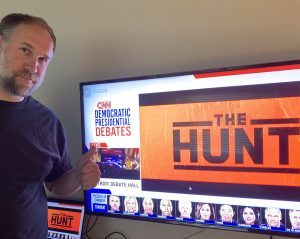 The director of The Hunt, Craig Zobel, says:
The director of The Hunt, Craig Zobel, says:
“Our ambition was to poke at both sides of the aisle equally. We seek to entertain and unify, not enrage and divide. It is up to the viewers to decide what their takeaway will be.”
I am not going to call him a liar, but I do get to doubt the sincerity of these good intentions. A casual observer of our media culture would conclude the opposite: that our media class is really quite interested in enraging and dividing rather than entertaining and unifying. It’s possible that Zobel doesn’t pay attention to any news at all and can’t see this. He’s also being disingenuous about the takeaway being up to the viewer. Every piece of art is weighted with the artist’s desire for the viewer to take away a certain idea, feeling, or impression. That The Hunt, a politically-charged piece of satire, is somehow different from all other movies ever made stretches credulity. There’s an agenda here, and to deny that is what enrages and divides us further. It insults our intelligence.
Zobel goes on to say:
“I wanted to make a fun, action thriller that satirized this moment in our culture — where we jump to assume we know someone’s beliefs because of which ‘team’ we think they’re on… and then start shouting at them. This rush to judgment is one of the most relevant problems of our time.”
I don’t disagree. Progressive Hollywood jumps to many assumptions about us hicks in flyover country and often shouts at us. They love to rush to judgment.
And, of course, he treats us to the standard progressive bromide:
“My hope would be that people will reflect on why we are in this moment, where we don’t have any desire to listen to each other. And if I’m lucky some of us will ask each other: how did we get here? And where do we want to go moving forward?”
That we have listened and still don’t find each other’s arguments convincing doesn’t seem to have sunk in yet. The American left has near-total control over mass media, education, news media, and social media. The rest of us don’t have a choice about listening: progressive messaging comes at us from all sides. We still think you’re wrong. About everything. It’s not a question of listening. You’ve got the biggest mouthpiece in human history and yet here you are, wishing we’d just listen. Why can’t you get it through your head that the more you talk, the more we dislike you? We think you’re wrong. You think we’re wrong. Listening isn’t the issue.
Where did you get the idea that you’re the only person who has asked how we got here and where we want to go? I’ve got simple answers to both questions. We got here because we got tired of our betters in entertainment, news media, and education pouring all three of these institutions into the toilet, so we’re pushing back, and you don’t like it. Hence movies like The Hunt. The question answers itself, no? Where we’re going is a cold civil war, where we develop our own versions of the institutions you’ve pissed all over. We can’t destroy them. We can only undermine their pretense to credibility.
It’s this lack of credibility that led to the outrage about the movie’s subject matter to begin with. Three decades ago, The Hunt might have worked as a blackly humorous slasher film. Instead of a Jason Voorhees-type murdering horny teenagers, it’s Democrats hunting Republicans…until the tables are turned. During those slightly less-divided times, we all could have laughed about how dumb and over-the-top it was. But Blumhouse, a famously woke production company, wasn’t in business then. They produced it today. So you’ll have to forgive us for not buying the idea that this is an even-handed satire of both sides, sight unseen. Hollywood doesn’t believe in the legitimacy of our side. You lost our trust, and you won’t get it back for generations.
It’s just a shame Universal pulled it.






August 16, 2019
The Stranger: K-Drama Review
I always try to live my principles instead of just bleating about them. And while hypocrisy isn’t the great sin of our age that our betters in mass media proclaim, it’s silly to proffer advice without taking that same advice yourself. If the dishes are dirty, you clean them. If there are people in need, you help them. And if you think Hollywood is a cesspit of degeneracy, pedophilia, horrible political activism, sexual assault, and institutionalized prostitution, you stop funding it. So I’ve eschewed all Hollywood-produced media made after 2000. I’ve opted out. It’s a lot easier to do than you might think.
It does leave a gap in my entertainment time, however; I’m a storyteller, and I find it valuable to not just read fiction, but watch it on the screen. And, let’s face it: who doesn’t like movies and TV?
So, like I’ve advised ad nauseam in this space, I’ve gone indie. And foreign. There’s a lot of outside-the-box material being produced away from the Hollywood machine; programs that are different not just to be different, but because the writers and directors aren’t bound by a formula that you can see coming before the starting titles flash across the screen. Not only that, but the focus on plot over diversity/ideological box-checking is refreshing.
Foreign television programs, particularly ones made by non-Western countries, provide valuable insight into storytelling that you won’t get through Hollywood. The differences make you look at plot and the unraveling of complexities in different ways. Despite our cultural differences, all human beings like a good story, and if something’s popular across the ocean, it’s probably going to strike a chord here in the States.
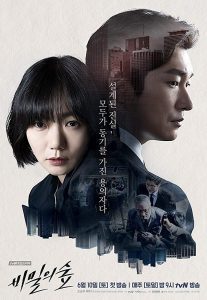 One example is the South Korean legal drama Stranger, available on Netflix. Starring Seung-woo Cho as prosecutor protagonist Si-Mok and Doona Bae as police detective Yeo-Jin, it’s a lengthy, complex thriller that handles several themes well, with characters that are entirely likable. Even the antagonists. The setup is that as a child, Si-Mok suffered from an ailment that gave him frequent sensory overload; after brain surgery, he was better able to function, but his ability to experience emotion was significantly lessened. What differentiates him from Star Trek’s Mr. Spock is that there’s no suppression of natural human reactions on Si-Mok’s part, nor are there slips into occasional emotionalism; he’s simply a man with a handicap. It’s the other characters’ reaction to his lack of affect that’s a sticking point in his day to day life. Seung-woo Cho plays this role with admirable subtlety, turning the character into a real person instead of a gimmick.
One example is the South Korean legal drama Stranger, available on Netflix. Starring Seung-woo Cho as prosecutor protagonist Si-Mok and Doona Bae as police detective Yeo-Jin, it’s a lengthy, complex thriller that handles several themes well, with characters that are entirely likable. Even the antagonists. The setup is that as a child, Si-Mok suffered from an ailment that gave him frequent sensory overload; after brain surgery, he was better able to function, but his ability to experience emotion was significantly lessened. What differentiates him from Star Trek’s Mr. Spock is that there’s no suppression of natural human reactions on Si-Mok’s part, nor are there slips into occasional emotionalism; he’s simply a man with a handicap. It’s the other characters’ reaction to his lack of affect that’s a sticking point in his day to day life. Seung-woo Cho plays this role with admirable subtlety, turning the character into a real person instead of a gimmick.
Yeo-Jin plays against Si-Mok’s straight man with required humor, but she doesn’t come off as comic relief. Once she gets used to him, her attempts at drawing him out of a shell from which he’s physically unable to leave become poignant; she doesn’t know that his coldness is an immutable characteristic. What’s remarkable about their chemistry is that it doesn’t move into romance or even longing. It simply isn’t an issue, despite that both characters are young, attractive, and single. They achieve a kind of friendship that Yeo-Jin insists upon at first, but becomes necessary to Si-Mok as the show progresses. How Doona Bae makes the character warm and funny without being childish and cute is a feat most actresses need to learn from.
The plot is complex without being complicated, involving murder, graft, and government corruption that reaches to the highest levels. Much of the action moves from character to character, giving the viewer a full picture of the story. The antagonists’ motivations are understandable despite their criminality; they’re real people making sometimes terrible choices in a dirty world.
There are some clumsy parts; the Dune-style insight into some characters’ thoughts gets to be a little over the top, and there’s so much detail that certain plot elements can get lost if you’re not paying very close attention to everything. This, however, seems more a function of South Korean television than an issue peculiar to this show, as I’ve noticed it in other K-dramas.
The acting is superb, and it’s fascinating to get a glimpse of how South Koreans portray themselves and their country on television. I suspect life in Korean cities isn’t all soju tents and Hyundai sports cars. Nevertheless, if you want to see a different culture’s form of storytelling with a fascinating narrative, you need to take a look at Stranger.






August 7, 2019
Let’s Talk About Blumhouse’s The Hunt
All fiction has justice as a theme: the writer’s imposition of justice on an unjust world. Slasher films focus on an avenger punishing sinners. Caper films like Ocean’s Eleven take money away from the unworthy rich. In romantic comedies, the right people find love because love is an external force. When it comes to movies where justice isn’t imposed, like The Omen or The Last Seduction, the viewer is left unsettled, deliberately so: Gregory Peck fails to kill the Antichrist, and is shot by police; evil, manipulative Linda Fiorentino gets away with the money. You remember those endings. Justice is either served or denied, but it’s always there. Fictional justice is the proxy we use to salve the sting of living in a world that rarely offers closure, let alone just desserts.
Blumhouse, a production company responsible for woke films like Get Out and The Purge series, is releasing a movie called The Hunt through Universal Pictures. The Hollywood Reporter tells us:
The violent, R-rated film from producer Jason Blum’s Blumhouse follows a dozen MAGA types who wake up in a clearing and realize they are being stalked for sport by elite liberals.
…
The script for The Hunt features the red-state characters wearing trucker hats and cowboy shirts, with one bragging about owning seven guns because it’s his constitutional right. The blue-state characters — some equally adept with firearms — explain that they picked their targets because they expressed anti-choice positions or used the N-word on Twitter. “War is war,” says one character after shoving a stiletto heel through the eye of a denim-clad hillbilly.
A quotable line from the movie explains, “Nothing better than going out to the Manor and slaughtering a dozen deplorables.”
The trailers suggest that it’s not all rainy days for the deplorables; the anti-hero protagonist is a woman who can, naturally, kick anyone and everyone’s ass without difficulty, and she turns the tables on the wealthy hunters. It’s supposed to be satire. You’re supposed to laugh. Justice will be served: first to the right-wingers, then to the progressives who hunted them. Don’t get mad, snowflake: it’s all very even-handed.
One cannot overestimate the outrage that Trump’s election elicited among our self-appointed betters in the entertainment media. Despite their pleading and shrieking and bleating, they were roundly rejected by the American electorate, whom they contemn. To children who have never been told no, it was unthinkable, and the tantrum they’ve been throwing since November of 2016 has yet to abate. Aided by an equally outraged news media, they have unleashed a torrent of vitriol aimed at Trump voters that continues to bleed into their creative work, and The Hunt is no exception. This film is progressive wish fulfillment on the big screen, no different from the unwatchable Lions for Lambs and Redacted during the Bush era. It’s violent masturbatory fantasy writ large against the left’s enemies. It’s justice against the normals.
I haven’t seen the film and won’t; I’ve learned too much about it. Nor I would I eat a plate of dog shit served by a hostile chef, even if the shit has rainbow sprinkles. And while I understand that the movie’s supposed to be satire, I’ve seen what the progressive left has done to humor over the last several years, and I want none of it. They’re not funny. They’ve redefined humor to mean angry screed, and all the jokes go one way and not the other. Late-night comedy is gone. Destroyed. Stand-up comedy is going the way of the dodo. All that’s left is progressive rage masquerading as entertainment.
Blumhouse’s execrable Get Out received near-universal praise because it addressed racial politics the left’s way, and progressives really, really have to show moviemakers of color that they’re great, so much better than white people. Lacking the race angle, The Hunt won’t get the affirmative action review treatment. That will likely doom it to mediocre reviews at best, and it’ll fade into obscurity.
At least they’ll have gotten their revenge against the deplorables. That’ll teach them.










